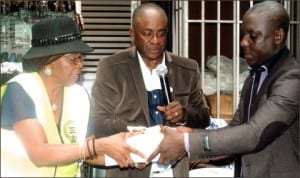Business
Nigeria: EU Plans More Grants For Power Supply
The European Union plans to increase financial aid to boost electricity supply in Nigeria in the next seven years, the Head of the EU Delegation in Nigeria, Mr Michael Arrion, has said.
Addressing

Rivers State Permanent Secretary, Ministry of Special Duties, Dame Mina Benebo (left), presenting some fire safety documents to Chairman, Mile One Market Traders Association, Deacon Keneth Eze (right), during a public sensitisation programme on fire safety and prevention to markets and parks organised by the Ministry in Port Harcourt last Wednesday. With them is Commissioner for Special Duties, Barrister Dickson Omunakwe.
newsmen on Monday in Abuja, Arrion said Nigerian officials and their EU counterparts met recently in Brussels to decide on programming priorities for the next seven years.
He said the EU financial grant to Nigeria under the 10th European Development Fund (EDF) for 2008-2013 was 677 million euros.
Arrion also said that the EU had in the last five years focused mainly on three main areas of intervention, namely economic governance, political governance and democracy and social governance.
“Besides seeking to consolidate on the gains of the 10th European Development Fund (EDF), the 11th EDF, 2014 to 2020, as envisaged will address critical sectors like electricity, food and national security.’’
He, however, said that the amount EU had earmarked for the next 11th EDF had not be finalised.
Arrion, who commended the successful implementation of the privatisation exercise in the electricity industry, said access to electricity remained central to Nigeria’s economic development.
According to him, the EU has contributed 27 million euro to improving access to renewable energy in six states in the ongoing projects that will run till 2018.
On security, the ambassador said that the EU had been hampered by limited financial resources to support the military aspect of security in Nigeria.
“We are addressing the civilian aspect of security crisis; but for the purely military aspect, we do not have the legal competence and the financial resources,’’ he said.
He said providing funds for training and technical assistance for Nigeria’s military was directly linked to sovereign states of EU as some states had existing military cooperation agreements with Nigeria.
On the insurgency in some parts of the country, the envoy said the EU was working with the office of the National Security Adviser to strengthen the capacity of security agencies.
Transport
Automated Points Concession : FAAN Workers Gave 72hrs To Revise Decisions In PH

Transport
FAAN Announces Pick-Up Points for Go-Cashless Cards

Business
Fidelity Bank To Empower Women With Sustainable Entrepreneurship Skills, HAP2.0
-
Politics4 days ago
2027: NIGERIANS FAULT INEC ON DIGITAL MEMBERSHIP REGISTER DIRECTIVE
-

 Environment4 days ago
Environment4 days agoLAWMA Director Says Sweeping Reforms Have Improved Waste Collection
-
Politics4 days ago
LP Crisis: Ex-NWC Member Dumps Dumps Abure Faction
-

 Politics4 days ago
Politics4 days agoUmahi Dismisses Allegations On Social Media, Insists On Projects Delivery
-

 Sports4 days ago
Sports4 days agoAbia Not Sure To Secure continental Ticket
-
Politics4 days ago
NATASHA ELECTRIC VEHICLES INITIATIVE IN KOGI CENTRAL
-
Sports4 days ago
La Liga: Yamal Records First Career Hat-trick
-
Politics4 days ago
IT’S A LIE, G-5 GOVS DIDN’T WIN ELECTION FOR TINUBU – SOWUNMI

